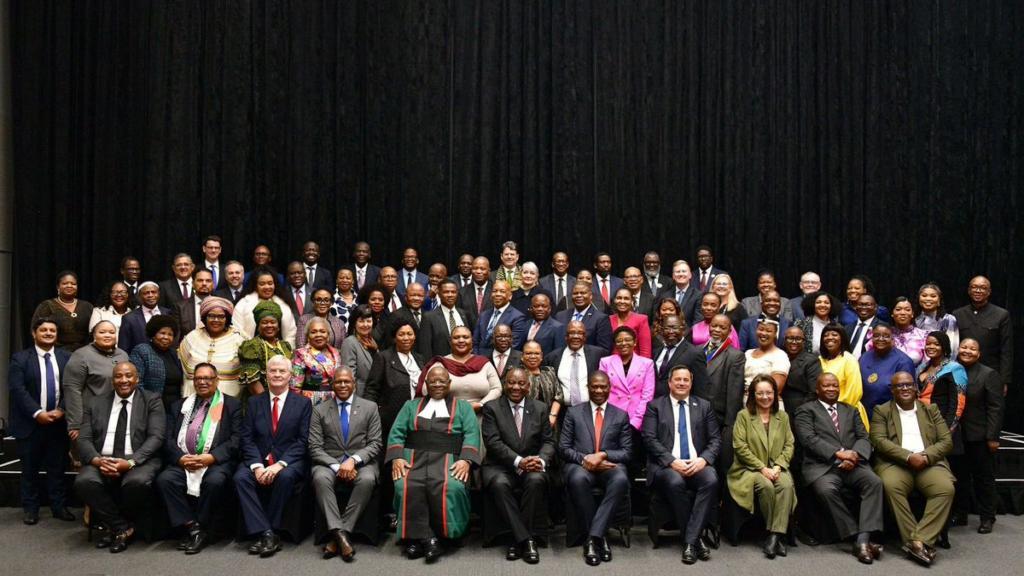Seth Thorne
Africa-Press – South-Africa. South Africa’s economy will likely continue to stagnate under the seventh administration, as the Government of National Unity (GNU) has failed to break away from the African National Congress (ANC)’s longstanding economic policies.
These are the views of Moeletsi Mbeki, political economist, author, and chairman of the South African Institute of International Affairs.
In an interview with BusinessTech, Mbeki calls the GNU “the ANC in drag,” because he says it has not departed from policies that have long benefited the African middle class to the exclusion of the broader population.
Mbeki said the ANC has prioritised the African middle class through policies such as Black Economic Empowerment (BEE), preferential procurement, a bloated public sector, and employment equity.
This focus, he said, elevated the living standards of public service employees but alienated the urban African working class and rural poor, whose economic needs went unaddressed and their quality of life eroded.
As a result, he said, the structural issues behind South Africa’s economic stagnation and high unemployment rate remain unresolved.
Central to Mbeki’s critique is his view that BEE, rather than driving broad-based transformation, has primarily enriched a narrow political elite while discouraging innovation and entrepreneurship.
This, compounded with rampant corruption in the public sector, led to the ANC’s historic loss of its majority in the 2024 elections, dropping to 40% of the vote—down from the 70% it held two decades ago.
“The ANC and their policies were rejected by the majority of the country,” he said, attributing the decline to “a number of policies that were very destructive to the South African economy.”
Having lost the ability to govern alone, the ANC formed a GNU with the Democratic Alliance (DA), the Inkatha Freedom Party (IFP) and seven other smaller parties—marking its second attempt at such a coalition.
GNU or ANC 2.0?
Renowned political economist, author, and chairman of the South African Institute of International Affairs, Moeletsi Mbeki.
Mbeki contrasted the current GNU with the first one, negotiated over four years starting in 1990. That GNU led to a new democratic constitution and fundamental policy shifts.
By contrast, the current GNU lacks any substantive change in economic direction, maintaining the status quo of previous ANC administrations.
At the start of negotiations, he said that there was widespread hope that the DA would use its parliamentary leverage to push for a shift in economic policy.
“The expectation of the country was that the DA was going to use this leverage to change the policies that the population was unhappy about,” Mbeki said. That hope has not materialised.
After two weeks of talks, the DA—with 22% of the vote—ultimately supported the ANC’s leadership choices, keeping Cyril Ramaphosa as President, Paul Mashatile as Deputy, and Thoko Didiza as Speaker.
He stated that no significant policy changes were required in return. The ANC’s only concession was granting a few cabinet posts to the DA and smaller parties, while growing an already large cabinet.
“The DA has not brought about any real change in the policies of the ANC,” Mbeki said. “So that’s why I said the government of national unity is just the ANC in drag.”
Butting heads
Since then, there have been several high-profile policy disagreements between the ANC and the DA, including the proposed increase in Value Added Tax (VAT), the Expropriation, and Basic Education Laws Amendment Acts.
These disagreements highlight growing tensions between the two parties, and the ongoing legal dispute over the national budget further reflects this divide.
Mbeki said policy concessions only began during the budget process, with the DA attempting to use its leverage to block the VAT increase.
A final decision on the VAT issue has yet to be made, but cracks have already been cemented, with the DA taking the ANC Finance Minister to court.
However, Mbeki said that while the DA has been vocal in its criticism on several fronts, it has not yet been successful in fundamentally altering the core policies the ANC has pursued.
These policies, he argued, continue to favor the African middle class at the expense of majority of the population, employment, and the country’s industrial development.
Source: businesstech
For More News And Analysis About South-Africa Follow Africa-Press






